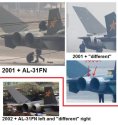In strategic studies, weapons such as J-20, F-22, T-50, ASBMs are all game changers. And I think what you're referring to will be the defensive dilemma in realism of international studies: one state creates a superweapon that leads to other states to create some too to prevent being put in harm's way by the state who has it
They are game changers in terms of tactical conventional cability, not strategic or nuclear.
The USA had B-2s but the B-2 fleet won`t stop SLBM fire from Submarines of artillery nuclear shells from being fired.
The B-2 even does not guarantee the ability to find mobile all ICBM launchers.
I mean the B-2 can change a war where there is no real chance of total nuclear war and only with a conventionally armed adversary.
Same is J-20, the J-20 might be able to down a F-22 or F-35 but it won`t stop an ICBM in flight or a SLBM in flight or deep in the sea from being launched or a nuclear armed artillery shell in flight.
So as the US in the 1990s knew, they know the Russians did not worry too much about the B-2, simply because the B-2 does not guarrantee unvulnerability to nuclear response.
Plus today IR detectors are able to detect stealth aircraft and new SAM like S-400 and even S-500 allow for longer ranges of engagements due to better radar and IR detectors and better preformance of missiles.
So having a stealth fighter is not a guarantee at all, even in air combat Rafale or Su-35 might be able to down stealth fighters.
So the J-20 of course has a big impact in conventional war, but in won`t change the ability of the nation deploying it of avoiding nuclear holocaust

